The 2023-2024 season was undeniably strong for Dartmouth College’s John Steel Hagenbuch (’25, U.S. B-Team).
In December, his was the fastest leg time in the Men’s 4×7.5 k Relay in Gällivare. One week later, he secured his first top-15 finish on the World Cup circuit, taking 13th place in the Östersund 10 k Freestyle. In February, he surprised himself with a bronze medal in the U23 World Championship Sprint in Planica.
Domestically, the wins came hard and fast. Hagenbuch rang in the New Year with a victory in the 20 k Freestyle at USSS Nationals in Soldier Hollow, UT, before proceeding to win every race he started in the Eastern Intercollegiate Ski Association—going six for six across the Vermont, Colby, and Middlebury Carnivals. Then, it was on to the NCAA Ski Championships, where he won the 7.5 k Freestyle, before finishing the season at the top of the 40 k Freestyle podium at Duluth, MN’s blizzard-battered Spring Nationals.
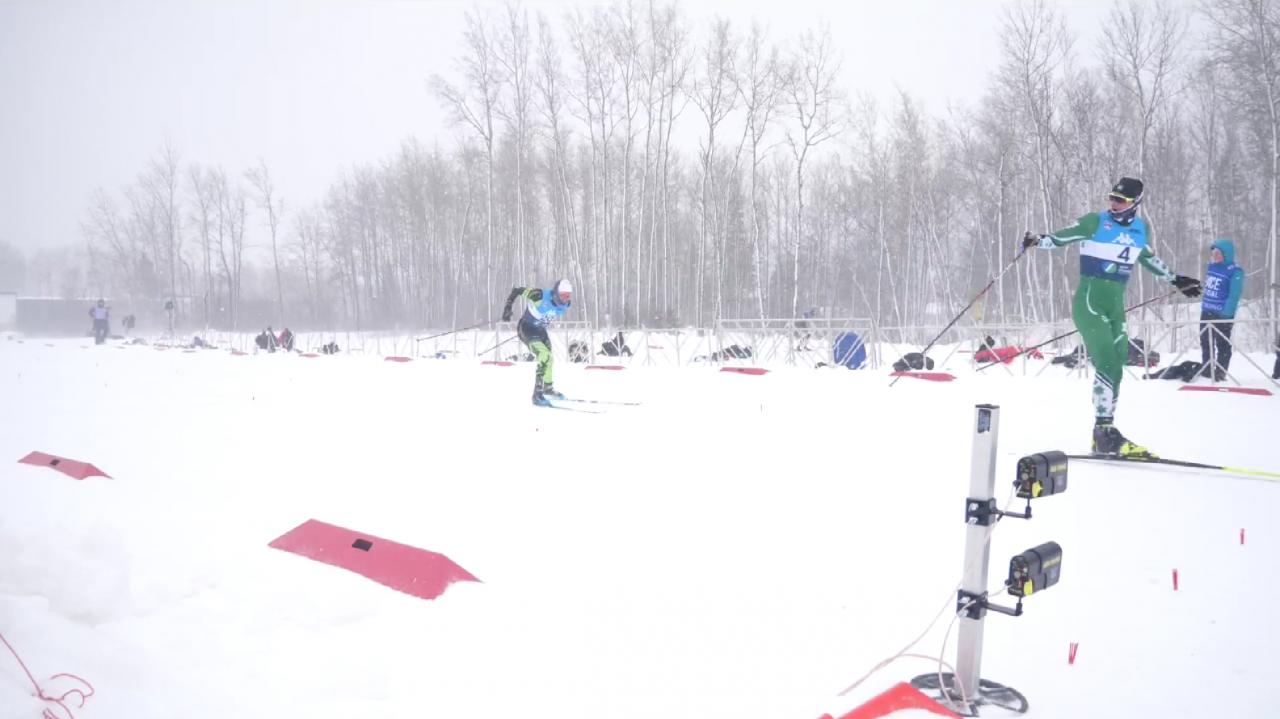
However, in a chapter of American skiing which has left commentators (understandably) salivating over career-defining performances, and quick to use the attendant, maximalist terminology, Hagenbuch resists any such characterization of his performances. “I genuinely don’t think [last season] was a breakout by any means,” he told this hyperbole-bandying writer. “Every year up to now has just been improvement in key areas, and just an evolution in my skiing […] I think it was just part of the processes, and just another step in my development.”
Steady development might not make for much of a pre-season story—but Hagenbuch’s approach towards training, racing, and the winter ahead certainly does. Indeed, the measured, circumspect, and profoundly grateful attitude with which he characterized last season evidently saturates his workouts, his performance goals, and his abiding love for the undergraduate experience. FasterSkier spoke with John Steel Hagenbuch to get the details on Dartmouth, “Shrimp Week,” and what’s next for the USCSCA’s Men’s Nordic National Skier of the Year.
Batting 0.750 on “the Four S’s”
In his third year of skiing for Big Green, Hagenbuch describes his life as a balancing act in several dimensions.
At the macro-level, there’s the challenge of pursuing three distinct strains of activity: academic commitments, NCAA racing, and skiing internationally. When it comes to college skiing and World Cup skiing, Hagenbuch admits “there’s not many people who do both,” but credits Ben Ogden (University of Vermont, ’22) as a “blueprint” for successfully competing in both worlds. “It’s awesome that the attitude has fundamentally changed from 20 years ago—it’s no longer ‘either or,’” Hagenbuch says.
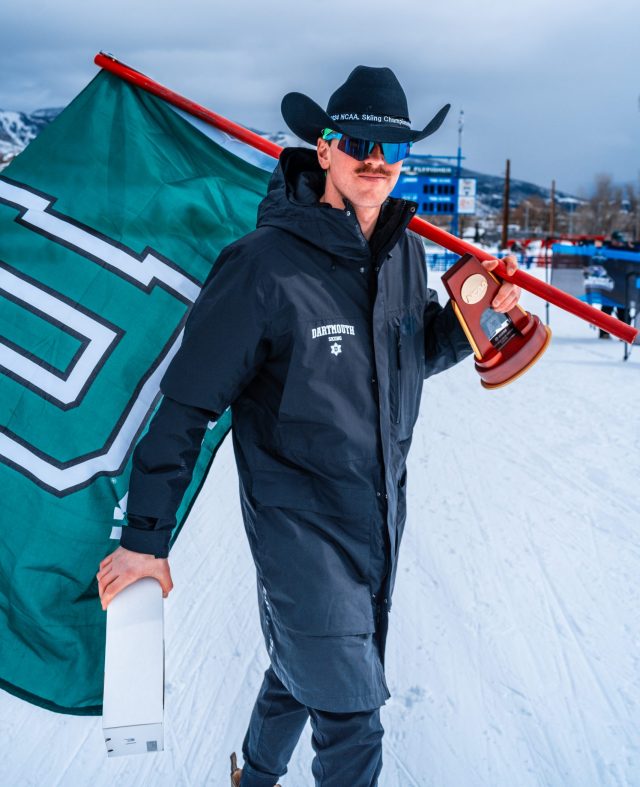
In his estimation, the space to compete at both the highest levels of domestic and international racing, while soaking up the undergraduate experience, is “going to sustain skiers’ careers for longer. Going to college is really fun, and for the time that I’m here, it provides a lot of balance in keeping things lighthearted and low-stress.” If Hagenbuch has a tough day, or even tough season (in a Q&A with The Dartmouth, he said of his 2021-2022 World Cup run: “Frankly, it sucked”), he has “other things to turn towards, and to look towards, to make [him] happy. Dartmouth is an amazing place; there’s so many amazing people with such diverse interests […] I’m so glad I took the opportunity to come here and live the life I’m living.”
With a rigorous battery of social events and campus traditions, however, comes a more micro-level balancing act. “I say I’m juggling Four S’s: Skiing, School, Sleep, and Socializing. On any given day, I can only choose to do three. It’s a sacrifice” (most often, it seems, of sleep), “but it’s one that I very willingly make to take advantage of a great education and a robust college experience while I’m the same age as my peer group, and still a ‘real kid.’”
Progress and Perspective
When it comes to training, juggling the Four S’s means making room for spontaneity—and a summer program that rejects restrictive regimen in favor of vibrance and variety. Indeed, Hagenbuch’s approach to the off-season seems to invert the perennial challenge of ‘Making training fun’ in favor of ‘Making fun training.’
When I ask him to describe his summer block in three words, Hagenbuch takes an uncharacteristic pause before settling on “Go with flow.” Over the last two years, he says he has been “the least stressed out about skiing since my freshman year of high school. A lot of that came down to having really great stuff going on in my life socially and academically, and actively choosing to think about those more.”
This isn’t to say that Hagenbuch was “prioritizing skiing less. It was just that I think [skiing] was taking less energy from me, and I was getting only positive things from it, as opposed to worrying about it. I think that enabled me to roll with the punches better, and not to stress.” Rather than fretting over a missed workout or a busy week, he recognized that he “can’t do everything all the time,” and would simply strive to maximize his focus and intensity during “moments when I felt good and had time to train, maybe even a little bit more than people would recommend […] When I zoom out, I realize that I hope to still be skiing a full ten years from now, and I’m not that worried about it. I’ve got a lot of time to make the progress that I need to, and get the notches on my belt that I need to.”
Hagenbuch’s extensive spring and summer highlight reel illustrates this perspective on a sustainable, “go-with-the-flow” off-season. Favorite spring workouts included skipping class to backcountry ski Tuckerman Ravine on a bluebird May day, and the “Occathon”—a marathon consisting of 18 laps around Occom Pond, “adjacent to the Dartmouth campus, with all these nice homes around it, and which adjoins Frat Row.” Hagenbuch began the run with a handful of teammates and fraternity brothers, but “40 to 50 other random people joined in throughout,” with football players, students, professors, and stray joggers pulled in by the energy of the event.
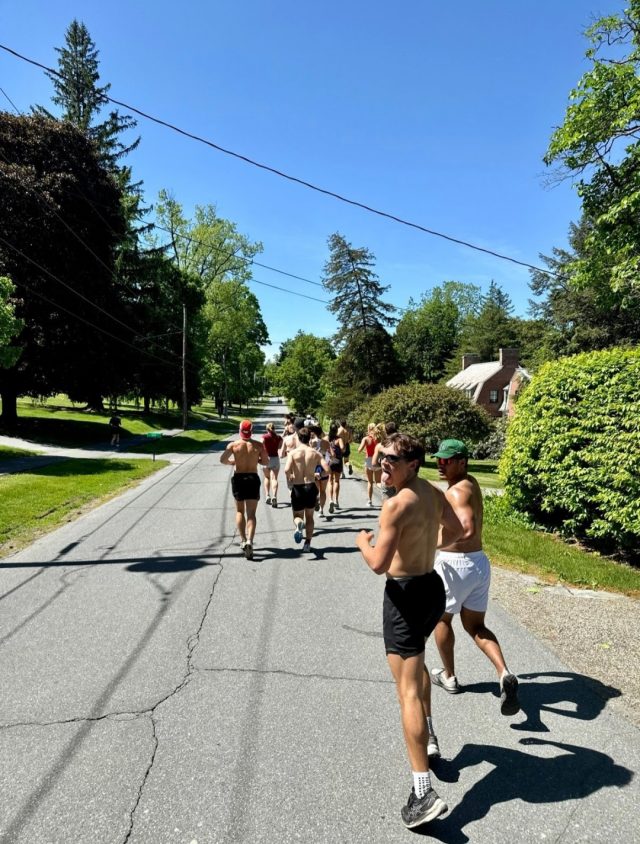
High summer at home in Sun Valley, Idaho brought more long days of backcountry skiing, including a “sketchy” July descent of McGowan Peak, as well as teaching classmates how to mountain bike, point-to-point 50 k trail runs in the Sawtooth Mountains, and a week of river-rafting. Although the lattermost trip may have come at a “time when most other people were probably putting their noses to the grindstone, I thought that it was something that would be a net positive in terms of relaxing for a bit, resetting the body and mind, and having some fun with my friends.”
When he returned to Hanover in late July, Hagenbuch adopted a more structured cycle—while still making time to soak up the energy of summer on campus (Dartmouth, with a quarter system, has classes year-round). He completed coursework, moved back into his fraternity, and was “training a lot, and hard, and getting in the sessions I needed to. Would I have done things a little bit differently? Would I have recovered a little bit better, or been X-percent better in a certain session? Had I gotten a little bit more sleep, probably, but I don’t really care.”
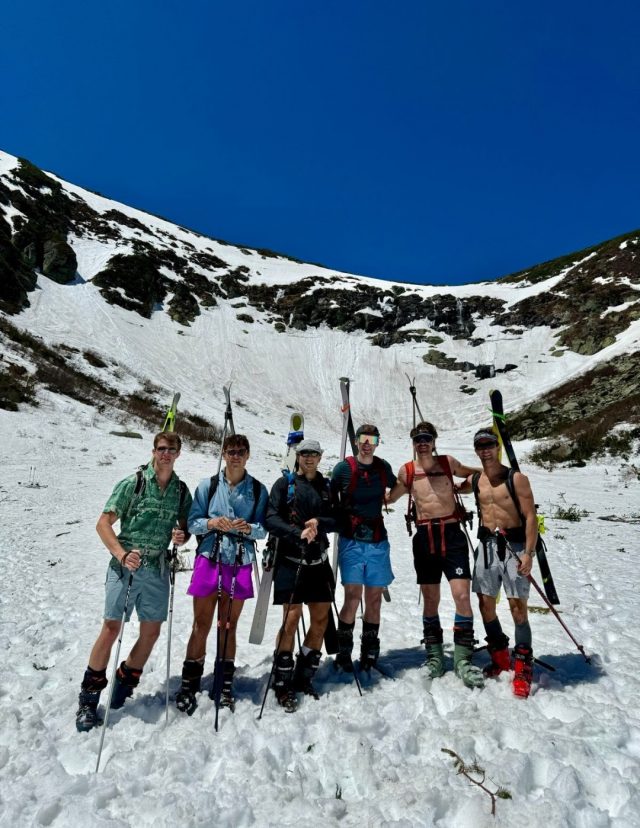
What Is Shrimp Week?
The first week of September stood in stark contrast to Hagenbuch’s otherwise-adaptable summer. Hagenbuch reportedly logged over 852 kilometers across 45 hours of running, rollerskiing and biking between September 2nd and September 8th—a sojourn he cryptically christened “Shrimp Week.”
When I asked for the logic behind both the Brobdingnagian volume block and the name, Hagenbuch admitted: “If you talk to most of the coaches I’ve ever had, and many of the people I train with, there are some things I do that there isn’t much logic behind. I was already planning on doing a volume week. I was still here in Hanover, but my buddies that had been here for sophomore summer had just left, and no-one on the ski team was here yet, so I was training all by myself. I was feeling good, feeling really fit […] and that was the barometer I went by every day—just thinking about how I was feeling when I was waking up, and fueling really well, sleeping well, and just training a bunch and seeing how that went.”
In essence: “I was curious how much I could do while still feeling good.”
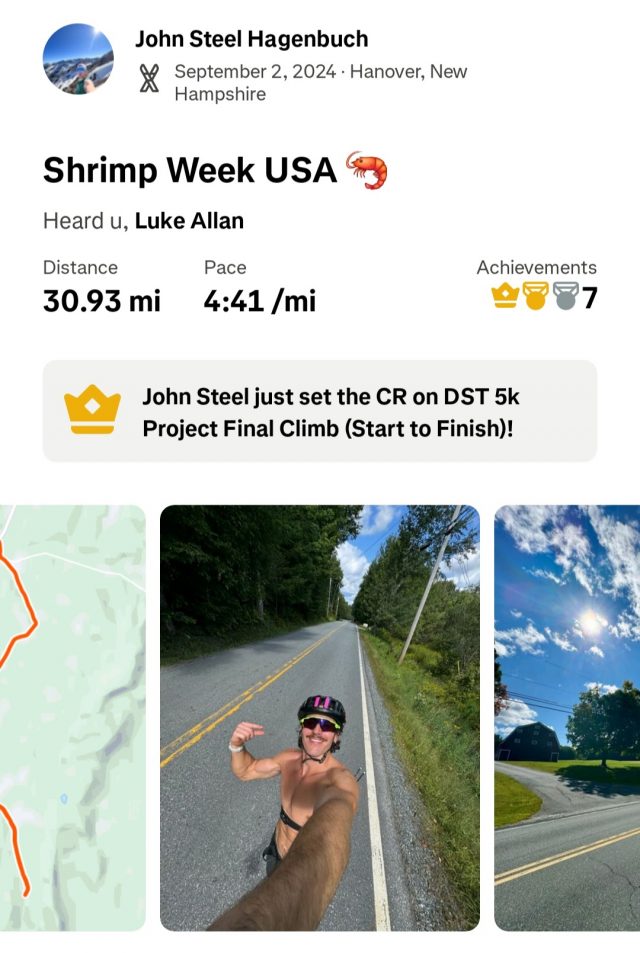
And, that name? “Well, Forrest Gump is one of my favorite movies. And there are some individuals that were doing some training and calling their volume weeks ‘Shark Week,’ which I thought was funny. So, I was kind of making fun of that.” Blood in the water!
Passing the Three Gates
When asked about the coming winter, Hagenbuch seems contentedly confident: confident that his body is “in a good spot and responding well” to autumn intensity; confident that he’ll continue to balance his Four S’s while hitting “key sessions”; and confident in the steady arc of progress he has thus far maintained.
In the 2023-2024 World Cup season, Hagenbuch aimed to have just one race in which he passed through the “three gates” to a strong performance—“good skis, good body, and good execution.” Between the Gällivare Relay and the Östersund 10 k, he had two (his Planica Sprint arguably constituted a third); this year, he’s simply looking to add to that total.
“Once again, all I’m really hoping for is to have a couple of races where I’m really happy that those three gates were fulfilled. And I think the results will come if that happens,” especially if he can improve his consistency in both disciplines. “I’m definitely not saying, ‘Oh, I need to get a top-ten.’ But a top-ten would be nice.”
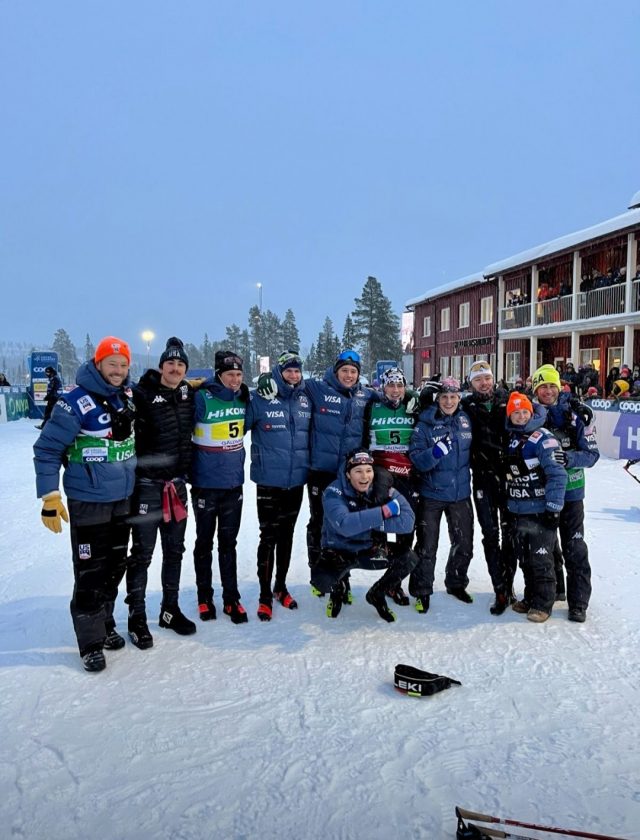
In addition to racing Period I, Hagenbuch plans to stay in Switzerland through Christmas and complete the Tour de Ski, where he hopes that the Alpine climbs and altitude, and potentially even Alpe Cermis, will play to his Sun Valley strengths.
While he is “not immune” to the nervousness that the approaching World Cup brings to many athletes, Hagenbuch cites the dynamic of the US Men’s Team as creating a relay-like atmosphere in which he can excel.
“When I think back on my best races, a lot of them have been relay legs, and I think that’s not a coincidence. You take a lot of internal and external pressure and stress out of racing” when “skiing for your teammates and not just for yourself.” The American Men “all like each other, and we’re all close friends. They’re all really, really great guys that I like to spend time with, I like to train with, and I like to race with. And I think we push each other in a really positive way that’s mutually beneficial […] I don’t mind if any of those guys beat me. I’m not racing against them. I’m racing against me. I’d love to see them do as well, if not better than, myself, because I know that if they’re capable of doing that, if they’re putting out those results, then that’s emblematic of the atmosphere and capacity of the whole team, including myself.”
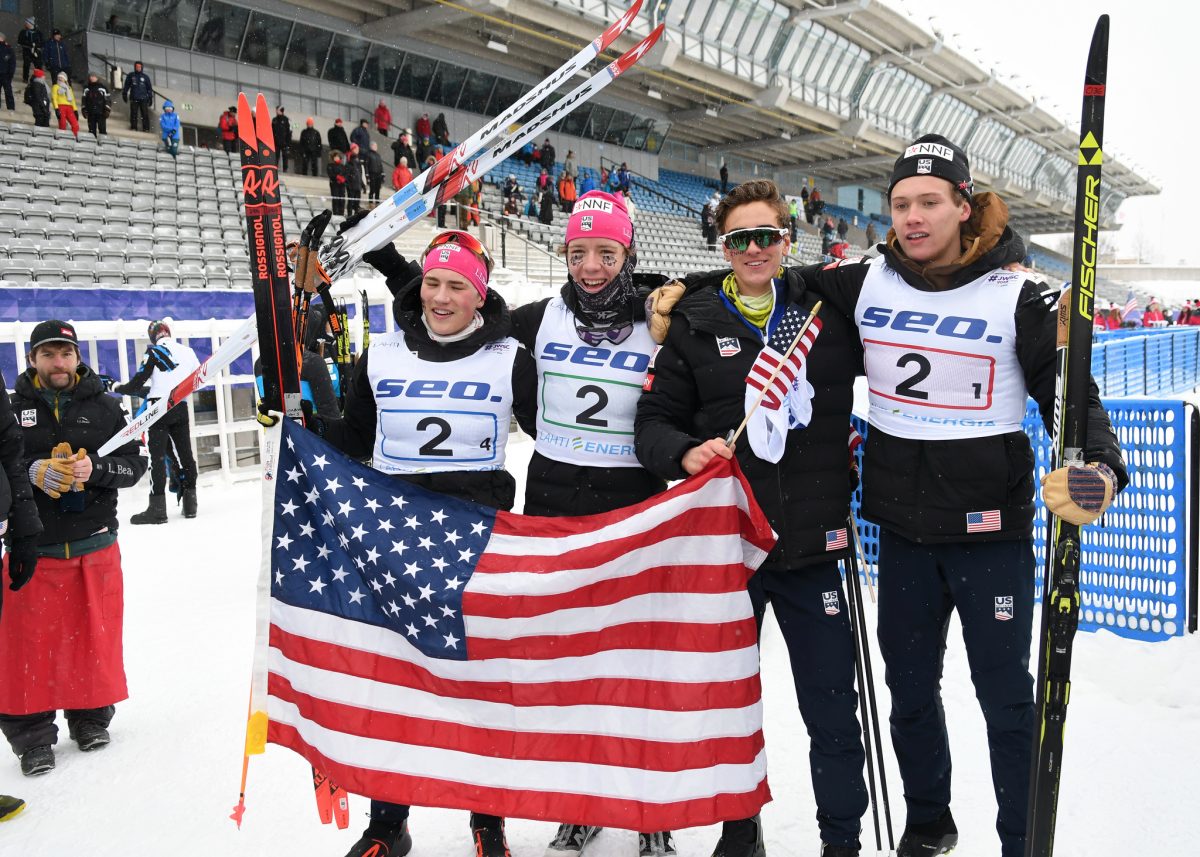
The Hound of Hanover
On American soil, however, Hagenbuch is looking to the 2025 NCAA Championships with vicious clarity.
The event will be on home turf in Hanover, with a 20 k Mass-Start Freestyle and a 7.5 k Individual-Start Classic. In the Classic race, he’s hoping to “improve on [his] runner-up finish from 2023” (read: win).
As for the Freestyle: “I’m going to be frothing-at-the-mouth rabid before the start of that race. It will certainly be, up to that point, the most important race of my career.”
Indeed, the man who will be defending his Championship title this March appears unrecognizable from the serendipitous spirit who “go-with-the-flow’ed” his way through the training sessions described above.
“I bring a kind of manic energy” to races, Hagenbuch says. Think Redbulls, really loud music (“I’ve blown out a couple van speakers in my day. ‘Rental Car Companies Hate Him for this One Simple Trick,’ for sure,” he admits), and more rabid dog analogies. “But that all gets tuned out and sharpened, like focusing a camera, when the gun goes off. And I love the catharsis at the end of the race, too, especially if it goes well.” Madness turns to the Campbell’s Monomyth: “You have a bit of ‘The Hero’s Journey’—the build-up,” the struggle of exertion and emotion, “and then, crashing down.”
Attending March’s NCAA Championships will come at the expense of a possible World Championship appearance. “I’m making the conscious decision that, should I qualify for the World Championships in Trondheim, which are at the same time as NCAAs, I won’t be going. Maybe that’s unwise. But Matt Whitcomb skied for Middlebury, and Chris Grover skied for Dartmouth, so they kind of understand. And this is a step in my career where I don’t think that I’m missing out on anything, by any means. This is a mutually beneficial thing: I get to ski for Dartmouth. I get to experience all that it is to be a Dartmouth student outside of the ski team. It’s an incredible privilege that I don’t want to pass up.”
With Hagenbuch hoping to be “in the best shape of [his] life March 6th-8th,” and the “NCAA Championships at home lining up with us having one of our strongest teams that we’ve maybe ever had across all disciplines—Nordic, Alpine, Men and Women,” he thinks that, “knock on wood, we could pull off something really special.”
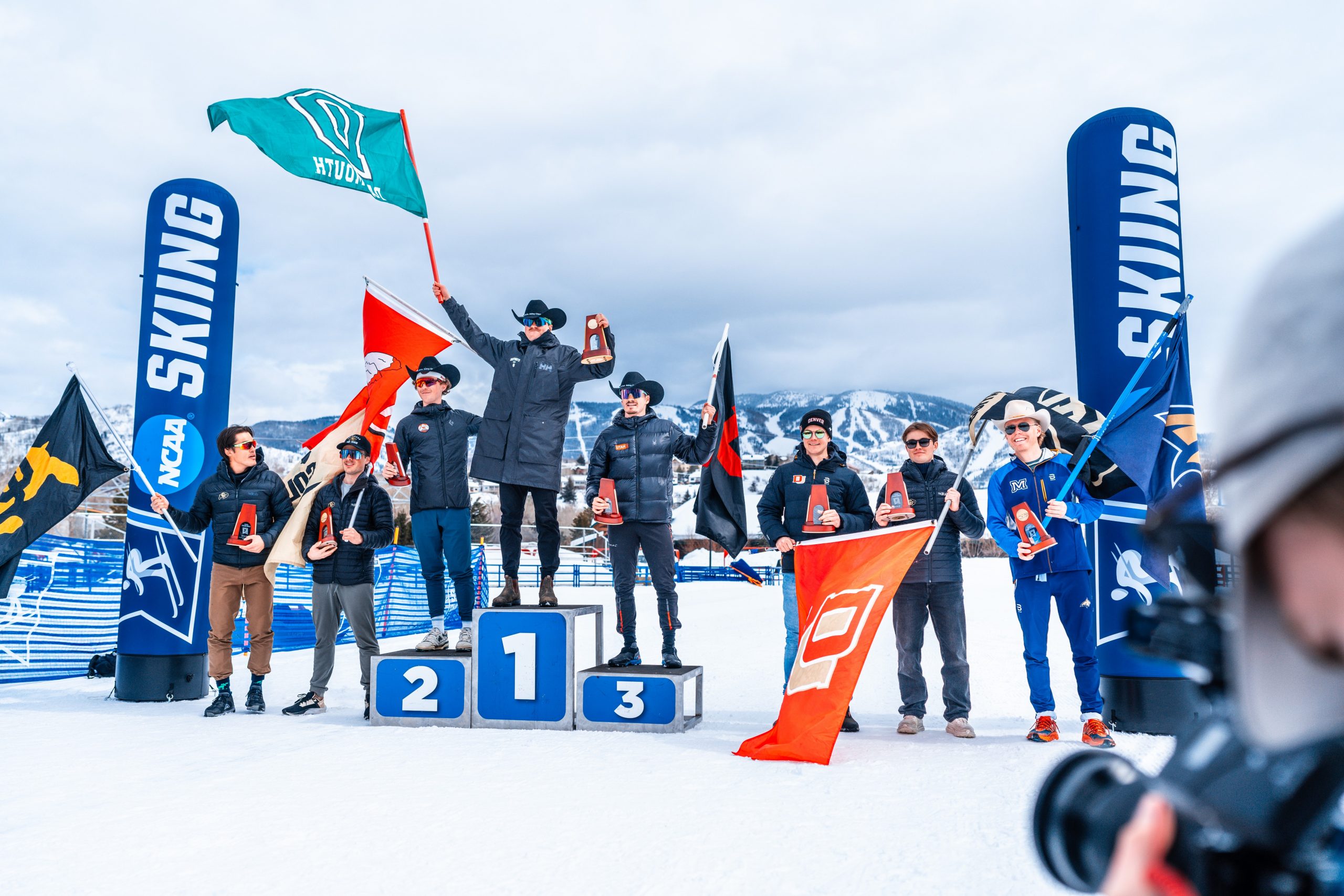
“Even if the stars don’t align for us, it’s going to be an amazing event.” The Big Green athletes and administrators are already working to build excitement about the races, and there is a long tradition of Winter Carnivals constituting the campus’s most energetic weekends. Hagenbuch anticipates Oak Hill ski complex will be transformed into a drum-pounding, sound-drowning amalgamation of Minneapolis, Holmenkollen, and Animal House, rowdily attended by Dartmouth’s most avid fans and most accomplished day-drinkers. Skiers Luke Allan, Jack Lang, Asa Chalmers, Cooper Camp, and Hagenbuch himself are “all in different fraternities,” each of which will send their own squad of course-crowders. “There will be hundreds of Dartmouth men” bringing encouragement (and liquid courage) to the trails, in addition to thousands of “parents, students, spectators, kids from other schools, all out there getting fired up and really loud for races.”
“Dartmouth is a bizarre place, out in the middle of nowhere. It’s a melting pot of a lot of different people. And, in a world that seems to have progressed a lot in many ways—technologically, socially—Dartmouth has largely remained the same, ‘Lest the old traditions fail.’” Whether relaxed or rabid, Hagenbuch feels especially privileged to live, train, and compete in this unique environment; one in which he savors the thrill of racing, the rigor of academic study, and the spontaneity that so ruddily colors undergraduate days.
And, despite holding a broad, even patient, view of his unfolding athletic career, he has clearly fixed March 8th, 2025 as his Polaris; a lodestar rising steadily above the near horizon, flickering with the white heat of anticipation and ambition.
“I don’t think a lot of the Western skiers, or even the other Eastern skiers, have any idea what it’s going to be like.”
FasterSkier thanks John Steel Hagenbuch for his time, and Leann Bentley for facilitating this interview. Some comments have been edited for length and clarity.
Luke Dykowski
Luke Dykowski is an alumnus of the University of Minnesota Nordic Ski Club ‘22, and is the Founder and Nordic Coordinator of the Midwest Collegiate Ski Association. He is currently a law student at Georgetown University.



